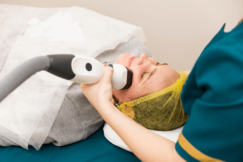The main cause for using cannabis is “feeling high” – an uplifted state of euphoria and lightness that this herb typically causes. Some advocates of medicinal weed use name the relaxation and stress-relieving effect of weed as its therapeutic benefits. However, weed is not enough for clinical depression treatment; people with severe depressive symptoms often mix weed and pills to achieve a more pronounced effect.

Unfortunately, there is little scientific insight into the actual consequences of mixing antidepressants with weed. Clinical studies are challenging because participants should agree to take a potentially dangerous mix, which is deeply unethical. So, here we discuss the available data about weed and antidepressant intake to shed light on the potential risks and underlying interactions.
Weed as an Antidepressant
So, what makes people use weed instead or (or together with) antidepressants? There’s a large body of clinical and anecdotal evidence of weed’s ability to make people happy, just like pills do.
- Lemberger was one of the first to report the potential therapeutic value of marijuana. The researcher’s 1980 study singled out many positive effects of cannabis on human health, ranging from cold prophylaxis to curing cancer.
- Martin et al. found medicinal cannabis could reduce anxiety and depressive symptoms in clinically anxious and depressed patients. Medicinal cannabis intake improved the patients’ sleep quality and also led to significant reported pain reduction.
- Hill et al. proposed using cannabis in antidepressant medication production due to its ability to compensate for the endocannabinoid deficits as the cause of depression.
- El-Alfy et al. noted the antidepressant action of cannabis, reporting its mood-elevating properties and recommending it for depression treatment.
- Bambico and Gobbi also found cannabis to share the mechanism of action with other antidepressants, as it can enhance neurogenesis in the hippocampus.
Given this evidence, many people suffering from anxiety, chronic stress, and depression choose weed in favor of antidepressant pills. If you’re one of them or know a person challenged by choice of stress-relieving strains, here is a list of top picks for healthy relaxation and antistress effect:
- Peanut butter
- Jungle Diamonds
- Garlic Breath strain (if you’re as puzzled by the name as we are, read more about Garlic Breath strain here)
- Fresh Water Taffy
- Mystery Weed
Still, weed users with depressive symptoms should keep in mind that weed is not a medication, strictly speaking. It can only alleviate the stress and anxiety symptoms for the period of cannabinoid effect without offering long-term symptom relief or treatment.

Mixing Weed with Other Antidepressants
The first thing to remember is that antidepressants alone are a tricky medication with many potential side effects and pharmacological interactions. So, you must be cautious about all other things you take along with antidepressants. For instance, antidepressants cause unpredictable adverse reactions with ibuprofen, while alcohol intake is strongly non-recommended.
What happens if you mix weed and antidepressants in one go? Science is unequivocal on this subject – you’ll feel pretty bad. However, the magnitude of your problems will depend on the antidepressant type you’re using.
- Selective serotonin reuptake inhibitors (SSRI), such as Prozac or Lexapro, are less dangerous for stoners. They cause low to moderate risks if used together with weed. Reports of weed-SSRI interactions are very rare.
- Serotonin and norepinephrine reuptake inhibitors (SNRIs) are another low-risk antidepressant category. The most frequently prescribed SNRIs are Cymbalta and Effexor XR.
- Norepinephrine and dopamine reuptake inhibitors (NDRIs) are not associated with severe side effects from weed use. You may be prescribed Wellbutrin or Fortivo XL for depression, anxiety, ADHD, and other associated conditions.
- Monoamine oxidase inhibitors (MAOIs) are very hazardous if consumed with weed. The overall MAOI intake is a serious treatment, with many side effects and interactions with seemingly innocent foods and medications. So, mixing it with weed is not recommended. The most frequently prescribed MAOIs are Parnate, Nardil, and Marplan.
- Tricyclic antidepressants (TCAs) are another high-risk medication category. Using TCAs with weed is a life-threatening behavior. So, if you’re taking Doxepin, Tofranil, or any other TCA, reserve your joint for a post-treatment period.
Antidepressant Treatment Safety Issues
As you might see now, weed is indeed used as an antidepressant and works well for these purposes. Still, it is classified as a mind-altering substance, so its administration is not recommended for people with risks of mania, psychosis, and other acute episodes.
Here are a couple of considerations for weed intake when on antidepressant treatment:
- Mind the type of antidepressant you’re using. Older-generation drugs bear higher risks of hazardous interactions and side effects, while newer-generation drugs pose lower health threats.
- Talk to your health practitioner about mixing weed with antidepressants. They will surely give more practical tips on the timing and dosage of both treatment modalities.
- Double-check which mechanism of action your antidepressant drug has. It can be an SSRI, an SNRI, or a TCA – each coming with different interactions with weed. TCAs are the most dangerous when combined with marijuana.
Besides, clinical observations show that using weed with any form of the antidepressant drug can lead to cognitive decline, addiction, and graver health problems. Thus, mixing an antidepressant with weed is generally a bad idea. Even if you feel down and have already tried one of the methods (weed or antidepressant) with no effect, take some time off to avoid the layering of effects.



